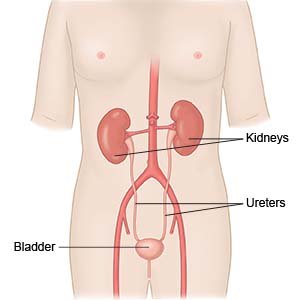Renal Cancer
Medically reviewed by Drugs.com. Last updated on May 6, 2024.
Renal cancer begins in the kidney or ureters. The ureters are the tubes that connect your kidneys to your bladder. Urine is made in the kidneys, collects in the bladder, and is emptied from your body through your urethra.
 |
WHILE YOU ARE HERE:
Informed consent
is a legal document that explains the tests, treatments, or procedures that you may need. Informed consent means you understand what will be done and can make decisions about what you want. You give your permission when you sign the consent form. You can have someone sign this form for you if you are not able to sign it. You have the right to understand your medical care in words you know. Before you sign the consent form, understand the risks and benefits of what will be done. Make sure all your questions are answered.
Intake and output
may be measured. Healthcare providers will keep track of the amount of liquid you are getting. They also may need to know how much you are urinating. Ask healthcare providers if they need to measure or collect your urine.
Pain medicine
may be given. Do not wait until the pain is severe before you ask for more medicine.
Tests:
- A urine test is used to test your urine for blood, cancer cells, and infection.
- X-ray, ultrasound, CT, or MRI pictures will show a kidney tumor. You may be given contrast liquid to help the tumor show up better in pictures. Tell the healthcare provider if you have ever had an allergic reaction to contrast liquid. Do not enter the MRI room with anything metal. The MRI machine uses a powerful magnet. Metal can cause serious injury from the magnet. Tell the healthcare provider if you have any metal in or on your body.
- Ureteroscopy and pyeloscopy are procedures to look inside of your ureters and kidney. Samples of tissue may be removed and tested for cancer. Ask your healthcare provider for more information on these procedures.
- A biopsy is a sample taken from the tumor and some tissue around it. The sample will be sent to a lab and tested for cancer.
- A bone scan may be done to see if cancer has spread to your bones. You will get a radioactive liquid, called a tracer, through a vein in your arm. The tracer travels to your bones and allows healthcare providers to see them better.
- Genomic sequencing tests may show which cells are causing cancer. This can help your provider choose which medicine to give you.
Treatment:
- Surgery is the main treatment for renal cancer. Your entire kidney may be removed, or only the part where the tumor is found. Lymph nodes or other tissues that contain cancer cells may also be removed.
- Procedures may be used to kill the cancer cells. Examples include cryosurgery, radiofrequency ablation, and arterial embolization. Ask your healthcare provider for more information about these procedures.
- Targeted therapy is medicine given to target and kill cancer cells. It may shrink a kidney tumor or slow its growth.
- Immunotherapy is medicine to help your immune system fight the cancer cells.
Treatment options
The following list of medications are related to or used in the treatment of this condition.
RISKS:
Cancer may spread to other organs, including your lungs and brain. Cancer that presses on your spinal cord may cause paralysis in your legs. You may get a blood clot in your limb. This may become life-threatening.
CARE AGREEMENT:
You have the right to help plan your care. Learn about your health condition and how it may be treated. Discuss treatment options with your healthcare providers to decide what care you want to receive. You always have the right to refuse treatment.© Copyright Merative 2024 Information is for End User's use only and may not be sold, redistributed or otherwise used for commercial purposes.
The above information is an educational aid only. It is not intended as medical advice for individual conditions or treatments. Talk to your doctor, nurse or pharmacist before following any medical regimen to see if it is safe and effective for you.
Learn more about Renal Cancer
Treatment options
Care guides
Symptoms and treatments
Further information
Always consult your healthcare provider to ensure the information displayed on this page applies to your personal circumstances.
